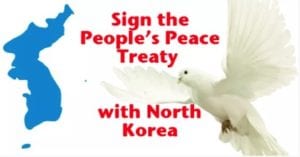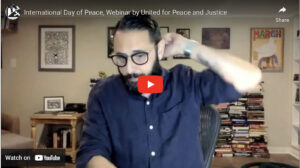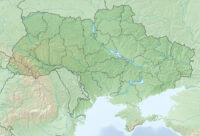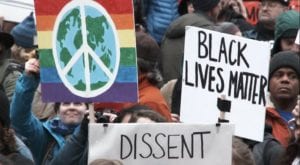
All of us who value and work for peace and justice in all forms recognize the critical need for us to step up our game in the face of national and international acts of aggression and escalating violence. It’s up to us to conduct and promote political education that will vanquish rumors and discredit bad analysis, it’s up to us to nurture relationships that will foment peace across difference, and it’s up to us to amplify voices that are demanding change in policy and practice. At this critical moment for the peace movement, UFPJ wants to share updates on the priority areas of work we identified in our 15th anniversary meeting at the end of 2017.
The Divest from the War Machine Campaign
The Divest 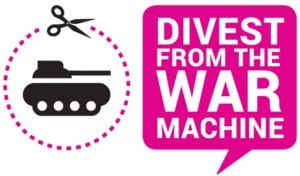 from the War Machine Campaign encourages individual investors and our nation’s financial institutions to take action to reduce violent global conflicts and the militarization of our world by removing invested financial assets from companies that profit from U.S. military interventions, the global arms trade, and the militarization of our streets. It is demanding that universities, religious organizations, individual investors, retirement funds, mutual funds, and other financial institutions in the United States stop making a killing on killing.
from the War Machine Campaign encourages individual investors and our nation’s financial institutions to take action to reduce violent global conflicts and the militarization of our world by removing invested financial assets from companies that profit from U.S. military interventions, the global arms trade, and the militarization of our streets. It is demanding that universities, religious organizations, individual investors, retirement funds, mutual funds, and other financial institutions in the United States stop making a killing on killing.
In February, a week of action helped campaigns launch on campuses and in cities across the nation. Twelve Congressional representatives have agreed to refuse campaign contributions from weapons manufacturers or the NRA. You can join efforts to grow the numbers of elected officials pledging to refuse funds from the war machine. Be sure to check out the resources for launching local campaigns to get your city or town to say no to investments that support weapons, military systems and nuclear power.
U.S. preoccupation with expanding and protecting its military and economic interests has created a deeply unjust system that prioritizes “defense” over human rights, military spending over diplomacy and aid, preparing for combat over preventing wars, and profit over human life and the health of the planet. The Campaign calls for a radical reimagining of American priorities. Revoking the power of those who profit most from making war is the first step in transforming our nation and ending the spread of violence, oppression, and death at home and abroad. Divestment returns power to the public. It is a means to demand that our nation upholds the rights of every human being to live in freedom and dignity, safe and free from poverty, danger, and despair, both at home and abroad.
The Korea Collaboration (Korea Peace Network)
In November 2017, the UN General Assembly adopted a resolution calling for an “Olympic Truce,” a cessation of hostilities during the Winter Games. The Korea Collaboration, an ad hoc network, called for weeks of action during the Winter Olympics and Paralympics, February 2 to March 25. Local actions included teach-ins, vigils, support for the People’s Peace Treaty, Congressional lobbying, and Olympic watch parties.
In a significant development, South Korean President Moon Jae-in persuaded a reluctant Donald Trump to postpone U.S.-South Korea war drills that would have overlapped with the Olympics. As a result of President Moon’s adroit diplomatic leadership, Chairman Kim Jung-un sent his sister to the Olympic Opening Ceremony, where North and South Korean athletes marched together under a unified Korean flag.
Following the visit of a special South Korean envoy to the North, on March 6, South Korea issued a major announcement that the North and South will hold a summit at Panmunjeom at the end of April. It went on to state:
- The North made known its will to denuclearize the Korean peninsula, stat and clearly stated that if military threats against the North are resolved and the security of its system is guaranteed, it has no reason to possess nuclear weapons;
- The North expressed readiness to have candid talks with the United States to discuss the issue of denuclearization and the normalization of US-DPRK relations;
- The North made clear that, as long as talks continue, it would not resume strategic provocations, such as additional nuclear or ballistic missile tests.
Remarkably, President Trump accepted Chairman Kim’s invitation to meet, as early as May. This spurred the Korea Collaboration to draft an Open Letter from US organizations to President Trump, President Moon and Chairman Kim, welcoming the extraordinary new diplomatic opening, and urging them to “patiently and diligently seek common ground”, noting that “the planned summits offer the potential for starting a serious process that could move us decisively away from the current crisis” and a formal resolution of the Korean War.
An Open Letter, signed by 110 peace, faith-based, professional, and Korean-American organizations across the country, including the American Federation of Teachers, praising these diplomatic breakthroughs, was released on March 26 at a press conference at the United Nations by UFPJ National Co-convener Jackie Cabasso.
The Korea Collaboration has merged with and become the Korea Peace Network. Planning is currently underway for National Call-in Days, starting April 24, in support of the North-South Summit on April 27, and National Advocacy Days in Washington, DC, June 11-12. Register here. You can find additional resources and useful articles here.
The No Foreign Bases Campaign
The C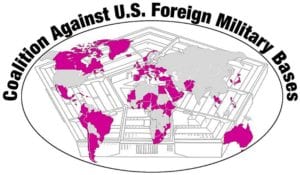 oalition Against U.S. Foreign Military Bases held a large and successful conference January 24 – 26 in Baltimore. Video of all the conference sessions is now available. Conference participants adopted four resolutions:
oalition Against U.S. Foreign Military Bases held a large and successful conference January 24 – 26 in Baltimore. Video of all the conference sessions is now available. Conference participants adopted four resolutions:
- Supporting national action against Guantanamo on February 23rd
- Supporting Hiroji Yamashiro and other Okinawa anti-bases activists who have been arrested in Japan
- Calling for a Global Conference Against U.S. and NATO Military Base
- Promoting Spring 2018 anti-war actions across the U.S.
The Coalition’s call for united days of action on the weekend of April 14 – 15, stated: “That weekend is right before Tax Day, Earth Day, and May Day, which gives us the ability to draw attention to the increase in military spending and the unpopular new tax bill, to point out that the U.S. military is the largest polluter in the world and address the growing deportation and vilification of immigrants, as well as violation of labor rights.”
“End the Wars at Home and Abroad!” demonstrations were in cities and towns across the U.S. Tragically, they were particularly timely given the current, escalating crises in Syria and Gaza.
The Poor People’s Campaign: A National Call for Moral Revival
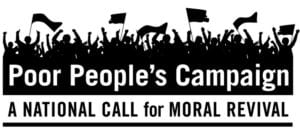
On April 10th, the Poor People’s Campaign: A National Call for Moral Revival, was launched at a press conference at the National Press Club in Washington, DC, with the release of “The Souls of Poor Folk: Auditing American 50 Years After the Poor People’s Campaign Challenged System Racism, the War Economy/Militarism, and Our National Morality.” This audit addresses the campaign’s four core issues:
- Racism
- Poverty
- The war economy and militarism
- Ecological devastation
40 days of planned campaign action will begin on Mother’s Day, May 13th. There will be a call for civil disobedience in state capitals with the hope that 1000 people per week will risk arrest each Monday during the 40 days. Each week will have a different theme:
- Week One (May 13-19): Child Poverty, Women and the Disabled
- Week Two (May 20-26): Systemic Racism, Voter Suppression and Immigration
- Week Three (May 27-June 2): The War Economy, Veterans and Education
- Week Four (June 3-9): Ecological Devastation and Health
- Week Five (June 10-16): Systemic Poverty, Jobs, Income and Housing
- Week Six (June 17-22): Challenging the Nation’s Distorted Moral Narrative
The Campaign will conclude with a mass rally and 24-hour vigil in Washington, D.C. and a Global Day of Solidarity on June 23rd. You can join the Poor People’s Campaign and learn more about its history, principles and demands here.
There are currently campaign Organizing Committees in 40 states and the District of Columbia. It was good to hear on a recent call about the structure of the organizing bodies. Each Organizing Committee must have at least one person of faith, one low-income advocate, one low-income person directly affected by current policies, and one person of color; no public officials can serve as Organizing Committee members.
UFPJ is proud to be a partner in the Poor People’s Campaign, and we plan to be very involved. Please let us know if you are not connected with your state campaign. We have contact information for state Organizing Committees and can help get you plugged in.

